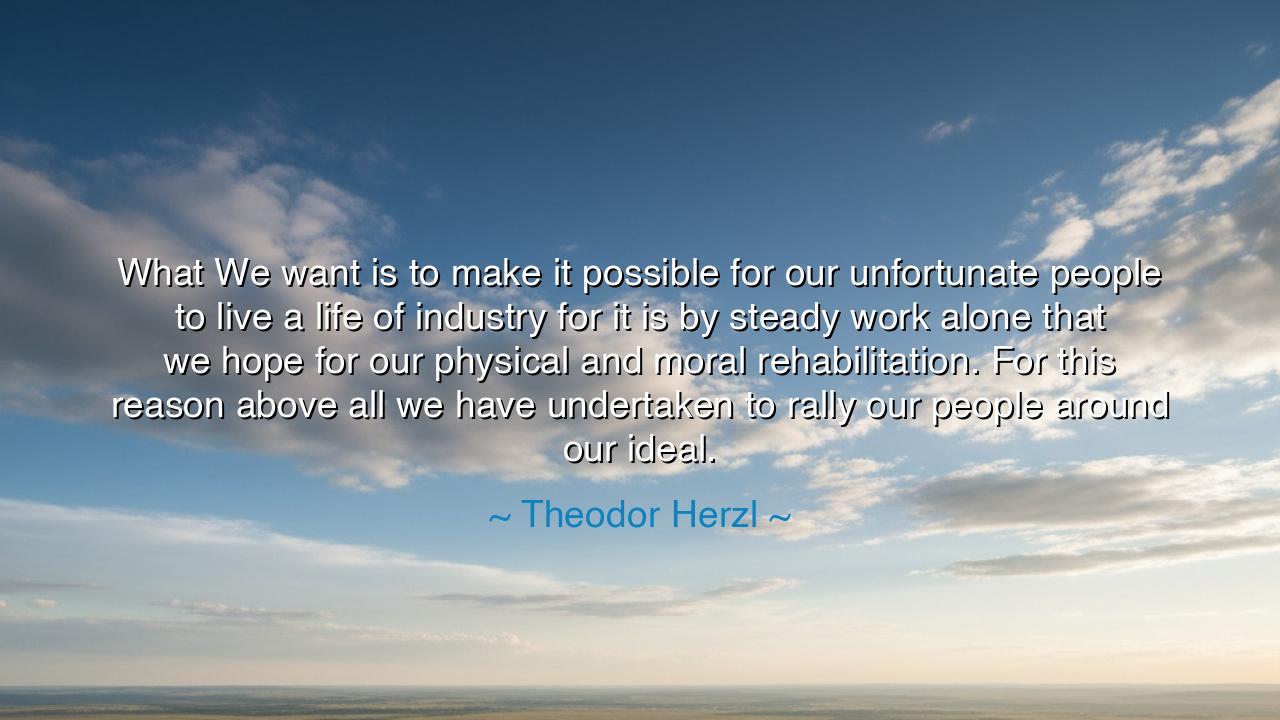
What We want is to make it possible for our unfortunate people to
What We want is to make it possible for our unfortunate people to live a life of industry for it is by steady work alone that we hope for our physical and moral rehabilitation. For this reason above all we have undertaken to rally our people around our ideal.






In the solemn and visionary words of Theodor Herzl, the father of modern Zionism, he proclaimed: “What We want is to make it possible for our unfortunate people to live a life of industry, for it is by steady work alone that we hope for our physical and moral rehabilitation. For this reason above all we have undertaken to rally our people around our ideal.” These words rise not merely from political ambition, but from the deep yearning of a nation long exiled — a people scattered across the earth, weary from centuries of persecution, yet unbroken in spirit. Herzl’s call is both a cry and a promise: that redemption, whether of a nation or of a soul, cannot come through pity or passion alone, but through labor, through discipline, through the sacred act of building with one’s own hands.
When Herzl speaks of a “life of industry,” he speaks not of mere toil or economic progress, but of dignity — the restoration of a people’s strength through the creative power of work. For generations, the Jewish people had been driven from their lands, denied ownership, and forced into fragile existences dependent upon the tolerance of others. Herzl saw that political independence without moral renewal would be hollow, and that the true foundation of freedom was not in declarations, but in deeds. To labor upon one’s own soil, to build one’s own future with one’s own effort — this was not just practical necessity, but spiritual resurrection.
The origin of this vision lies in the closing years of the nineteenth century, when Europe’s Jews faced both the promise of enlightenment and the poison of renewed antisemitism. Herzl, an Austrian journalist and playwright, witnessed the infamous Dreyfus Affair in France, where injustice exposed the fragility of assimilation. In that moment, he realized that a people without a homeland would never find peace. But he also understood that a homeland could not simply be granted — it must be earned, cultivated by the collective labor of those who believed in it. Thus, his dream of Zionism was not a dream of conquest, but of creation: a nation reborn through work, unity, and purpose.
Consider the story of the early pioneers who answered Herzl’s call. They came to the desolate plains of Palestine — barren hills, swamps filled with disease, land forsaken by centuries of neglect. Yet, guided by Herzl’s vision, they began to dig, to plant, to drain, to build. They worked not for wages, but for the rebirth of their people. Each stone they lifted, each furrow they plowed, was a prayer in action. Through their hands, the desert began to bloom, and the scattered identity of a people began to take root again in soil that remembered their ancestors. Their sweat became the ink that wrote the opening chapters of a nation’s return.
In this, Herzl’s words reveal a deeper truth — that work is the highest form of faith. For to labor steadily toward a vision unseen is to believe not only in the future, but in the worth of one’s own effort. The “moral rehabilitation” of a people, as Herzl describes, begins when despair gives way to discipline, when the oppressed refuse to remain victims, and when unity is forged not in complaint but in construction. Just as iron is tempered by fire, so is the soul of a nation strengthened through work.
Yet Herzl’s message is not limited to the Jewish people — it is a universal law of renewal. Every individual, every generation, must find its own ideal and rally to it through effort, not idleness. Dreams without labor decay into illusions. The one who builds with his hands builds also his character. The one who works not for vanity but for the good of others becomes an instrument of restoration — not only of himself but of all humanity.
Let this, then, be the teaching: to heal, one must work; to rise, one must create. Whether it be a nation seeking rebirth, or a soul seeking redemption, the path is the same — steady work, guided by purpose, inspired by faith. Seek not ease, for ease weakens the will; seek not fame, for fame fades with the wind. Instead, devote yourself to the labor that outlives you — the work that serves something greater than self. In that labor lies the secret of strength, the essence of dignity, and the promise of renewal.
Thus, the wisdom of Theodor Herzl endures as both prophecy and command: that the highest freedom is not given, but made; not inherited, but built. Through industry, through unity, through unyielding faith in the ideal, men and nations alike are redeemed. For the one who labors not only for himself, but for the good of all, molds not just the earth beneath his hands — he molds the destiny of the world.






AAdministratorAdministrator
Welcome, honored guests. Please leave a comment, we will respond soon